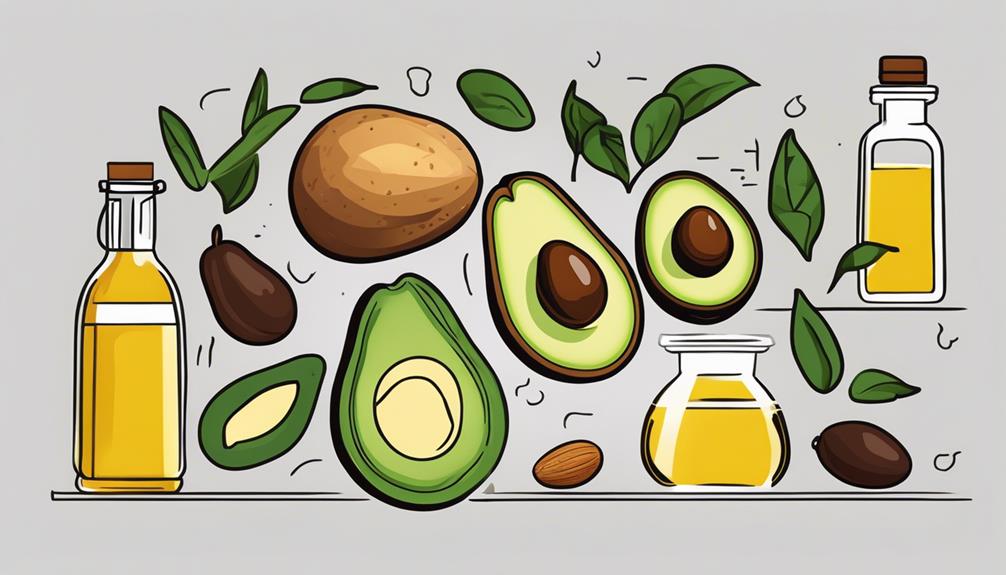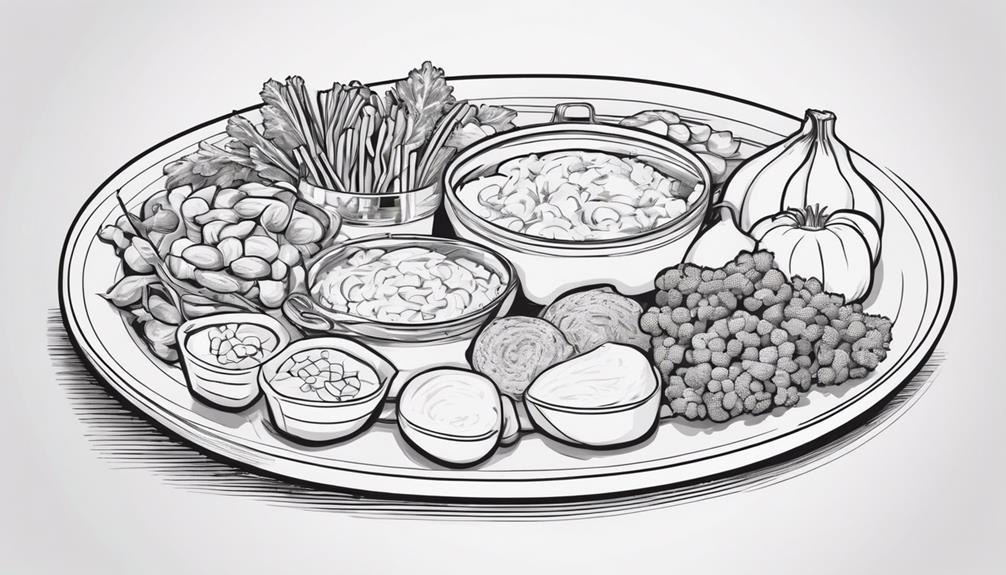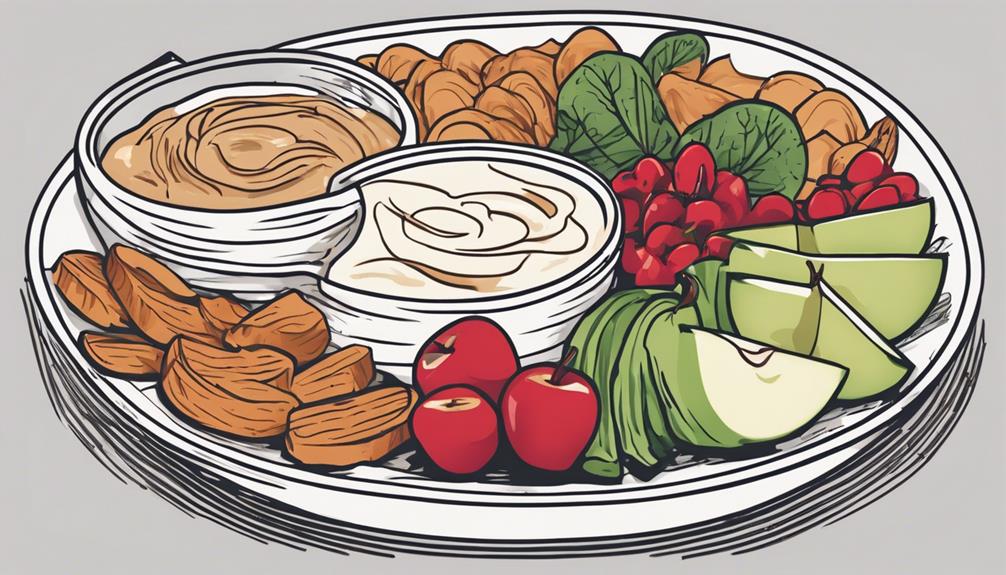When it comes to managing your diabetes, staying ahead of the curve is essential. By implementing a few key dietary adjustments, you can take control of your health and well-being.
From navigating low-carb meal planning to selecting the right sugar substitutes, these top 10 strategies can make a significant impact on your journey towards diabetes control.
So, are you ready to embrace a healthier lifestyle and make food choices that support your well-being?
Key Takeaways
- Opt for low-carb meals with lean proteins and healthy fats for optimal blood sugar control.
- Include fiber-rich foods for satiety, stable energy, and improved digestion.
- Incorporate healthy fats like avocados and nuts to enhance insulin sensitivity and heart health.
- Choose suitable sweeteners, balance protein intake, and practice mindful eating for effective diabetes management.
Low-Carb Meal Planning

When planning your meals to manage diabetes, consider incorporating a low-carb approach for optimal blood sugar control. Low carb recipe ideas can help you regulate your blood glucose levels effectively.
Meal prep tips can make it easier to stick to your low-carb plan throughout the week. Start by filling your plate with non-starchy vegetables like leafy greens, broccoli, and bell peppers. These veggies are high in fiber and nutrients while being low in carbs. Incorporate lean proteins such as chicken, fish, tofu, or legumes to help you feel full and maintain muscle mass. Healthy fats like avocado, nuts, and olive oil can add flavor and satisfaction to your meals without spiking your blood sugar.
To simplify your low-carb meal planning, consider batch cooking on weekends and portioning out meals for the week ahead. This can save you time and prevent impulsive food choices. Experiment with different spices and herbs to add variety to your dishes without relying on high-carb sauces or seasonings.
With thoughtful planning and delicious low-carb recipes, managing your diabetes through diet can be both effective and enjoyable.
Fiber-Rich Food Choices
When managing diabetes, incorporating fiber-rich foods into your meals can significantly benefit your blood sugar control.
Opt for high-fiber options like whole grains, legumes, fruits, and vegetables to help regulate your glucose levels.
These choices can provide essential nutrients while promoting satiety and stable energy throughout the day.
Fiber Benefits Blood Sugar
To optimize blood sugar control, incorporate fiber-rich foods into your daily diet. Fiber offers significant benefits for managing blood sugar levels by slowing down the absorption of sugar and improving overall digestive health.
Here are three ways fiber benefits blood sugar:
- Gut Health: Fiber promotes a healthy gut environment by supporting the growth of beneficial bacteria, which can positively impact blood sugar regulation.
- Weight Management: High-fiber foods tend to be more filling, helping you feel satisfied for longer periods and potentially aiding in weight management, which is crucial for diabetes control.
- Blood Sugar Regulation: Fiber-rich foods help stabilize blood sugar levels, reducing the likelihood of spikes and crashes throughout the day. Incorporating fiber into your meals can contribute to better blood sugar management.
High-Fiber Food Options
Incorporating high-fiber food options into your daily meals can significantly enhance your dietary choices for better blood sugar control. Fiber-rich foods like fruits, vegetables, whole grains, and legumes not only help regulate blood sugar levels but also promote overall health.
If you find it challenging to meet your fiber requirements through food alone, consider using fiber supplements as a convenient alternative. Additionally, exploring high fiber recipes can make your meals more exciting and enjoyable while ensuring you get the fiber intake your body needs.
Healthy Fats Incorporation

When managing diabetes, incorporating healthy fats into your diet can offer various benefits. Understanding the sources of healthy fats, such as avocados, nuts, and olive oil, can help you make informed choices.
Cooking with healthy fats like coconut oil or using them in salad dressings can be a simple way to enhance the nutritional quality of your meals.
Benefits of Healthy Fats
Incorporating healthy fats into your diet can provide numerous benefits for managing diabetes effectively. Healthy fats, such as those found in avocados, nuts, and olive oil, offer essential nutrients and help regulate blood sugar levels. Here are three key benefits of incorporating healthy fats into your meals:
- Improved Insulin Sensitivity: Healthy fats can enhance insulin sensitivity, making it easier for your body to use glucose for energy and potentially reducing the need for medication.
- Heart Health: Consuming healthy fats can improve heart health by lowering bad cholesterol levels and reducing the risk of cardiovascular diseases, which are common complications of diabetes.
- Satiety: Including healthy fats in your meals can increase feelings of fullness and satisfaction, potentially helping you manage your weight and blood sugar levels more effectively.
Sources of Healthy Fats
To effectively include healthy fats in your diet for better diabetes management, consider incorporating sources like avocados, nuts, and olive oil.
Avocado benefits include being rich in monounsaturated fats, which can help improve insulin sensitivity. Nuts, such as almonds and walnuts, are excellent Omega-3 sources that can reduce inflammation and lower the risk of heart disease, common in diabetes.
Olive oil, a staple of the Mediterranean diet, provides monounsaturated fats and antioxidants that promote heart health. Including these healthy fats in your meals can help stabilize blood sugar levels and reduce the risk of complications associated with diabetes.
Aim to incorporate these sources into your diet regularly to support overall health and diabetes control.
Cooking With Healthy Fats
Consider enhancing your culinary creations with healthy fats like avocados, nuts, and olive oil to elevate both flavor and nutritional value in your meals. When cooking with healthy fats, you have the opportunity to make delicious dishes while supporting your health goals. Here are some tips to help you incorporate healthy fats into your cooking:
- Baking Alternatives: Experiment with using mashed avocados or nut butters in place of butter or oil in baked goods for a moist and nutrient-rich result.
- Oil Choices: Opt for heart-healthy oils like olive oil or avocado oil for sautéing and salad dressings to add a burst of flavor and beneficial monounsaturated fats to your meals.
- Nutty Flavors: Add a crunchy texture and rich taste to your dishes by sprinkling chopped nuts on salads, yogurts, or stir-fries.
Portion Control Strategies

For better diabetes management, focus on practical portion control strategies. Mindful eating is essential for managing blood sugar levels effectively. Start by being aware of portion sizes and avoid mindlessly overeating. One helpful strategy is to use smaller plates and bowls to naturally limit your portions. Additionally, measuring your food with cups or a food scale can give you a better understanding of serving sizes.
Another useful tip is to avoid eating straight from the package, as you may unintentionally consume more than you need. Instead, portion out snacks into individual servings to prevent overindulging. Planning your meals and snacks in advance can also help you make healthier choices and control portion sizes.
Sugar Substitutes Selection
When choosing sugar substitutes for diabetes management, consider options like stevia, erythritol, or monk fruit, as they've minimal impact on blood sugar levels.
These alternatives can help satisfy your sweet tooth without causing significant spikes in your glucose levels.
Experiment with different substitutes to find the one that suits your taste preferences and blood sugar control needs best.
Best Sugar Substitutes
Selecting the best sugar substitutes involves evaluating their impact on blood sugar levels and overall health. When choosing sugar substitutes, consider their influence on glycemic response and any potential side effects. Here are three options to consider:
- Baking alternatives: Look for sugar substitutes specifically formulated for baking to ensure the best results in your recipes.
- Artificial sweeteners: These are low-calorie or calorie-free sugar substitutes that can be used to sweeten foods and beverages without causing blood sugar spikes.
- Natural sweeteners, sugar alcohols: Opt for natural sweeteners like stevia or monk fruit, or sugar alcohols like erythritol and xylitol, which have minimal impact on blood sugar levels.
Make informed choices based on your health goals and taste preferences.
Impact on Blood Sugar
Evaluate the impact of sugar substitutes on your blood sugar levels to make informed choices for optimal diabetes management and overall health. Sugar substitutes can impact blood sugar differently based on factors like glycemic load and carbohydrate quality.
Some substitutes may still cause blood sugar spikes, affecting insulin sensitivity. Opt for sugar substitutes with lower glycemic indexes to minimize these spikes and support better blood sugar control. Stevia, erythritol, and monk fruit are examples of sugar substitutes that have little to no effect on blood sugar levels.
Always read labels and be mindful of hidden sugars in products labeled as 'sugar-free.' Making smart choices about sugar substitutes can help you maintain stable blood sugar levels and improve your overall well-being.
Balanced Protein Intake

To maintain balanced protein intake for optimal diabetes control, focus on incorporating a variety of lean protein sources into your meals.
- Choose Lean Protein Sources: Opt for lean meats like skinless poultry, fish, tofu, legumes, and low-fat dairy products to meet your protein needs without excess saturated fats.
- Monitor Portion Sizes: Be mindful of portion sizes to avoid excessive protein intake, which can lead to elevated blood sugar levels.
- Spread Protein Intake Throughout the Day: Distribute your protein consumption evenly across meals to help stabilize blood sugar levels and promote satiety.
Maintaining a balanced protein intake is essential for managing blood sugar levels effectively. By diversifying your protein sources, controlling portion sizes, and spreading protein intake throughout the day, you can support your diabetes management goals.
Glycemic Index Awareness
Maintaining a balanced protein intake is crucial for diabetes management. When considering Glycemic Index Awareness, understanding how different foods affect blood sugar levels can further optimize your dietary choices for controlling diabetes. The Glycemic Index (GI) ranks carbohydrates based on how they impact blood sugar levels. Foods with a high GI cause rapid spikes in blood sugar, while low GI foods result in slower, more controlled increases. By choosing low GI foods such as whole grains, legumes, non-starchy vegetables, and fruits like berries, you can help maintain stable blood sugar levels throughout the day.
Additionally, paying attention to meal timing can play a significant role in managing blood sugar. Consistent meal spacing and avoiding long periods without eating can prevent extreme fluctuations. Exercise benefits can't be overstated in diabetes management as it helps improve insulin sensitivity and blood sugar control. By combining low GI foods, mindful meal timing, and regular exercise, you can make impactful strides in managing your diabetes effectively.
Hydration Importance

Ensuring adequate hydration levels is essential for optimal diabetes management and overall health. Proper water consumption plays a crucial role in maintaining electrolyte balance and aiding in rehydration, both of which are vital for individuals with diabetes.
Here are three key points to consider when focusing on hydration:
- Monitor Your Fluid Intake: Pay attention to your water consumption throughout the day. Aim to drink at least 8-10 cups of water daily, but individual needs may vary based on factors like activity level and climate.
- Choose Water Over Sugary Drinks: Opt for water as your primary source of hydration to avoid added sugars and unnecessary carbohydrates, which can negatively impact blood sugar levels.
- Replenish Electrolytes Wisely: If you engage in intense physical activity or experience prolonged periods of sweating, consider replenishing electrolytes through options like sugar-free sports drinks or electrolyte tablets while being mindful of their impact on your blood sugar levels.
Mindful Eating Practices
For optimal diabetes management and overall health, practicing mindful eating habits is crucial. Mindful eating involves paying full attention to the experience of eating and enjoying the texture, flavors, and aromas of your food. To incorporate mindful eating into your routine, start by eating without distractions like phones or TVs, allowing yourself to savor each bite. Additionally, try to eat slowly, chewing your food thoroughly, and pausing between bites. Mindful eating tips also include listening to your body's hunger and fullness cues, stopping when you feel satisfied rather than overly full.
Mindful meal planning is another essential aspect of diabetes control. When planning your meals, focus on incorporating a variety of nutrient-dense foods such as fruits, vegetables, whole grains, lean proteins, and healthy fats. By being mindful of your food choices and portions, you can better manage your blood sugar levels and overall health. Prioritize balanced meals that provide sustained energy throughout the day, helping you maintain stable blood sugar levels and avoid spikes.
Nutrient-Dense Snack Options

To enhance your diabetes management and promote healthy eating habits, consider incorporating nutrient-dense snack options into your daily routine. When choosing snacks, opt for options that provide a good balance of macronutrients and that can help stabilize blood sugar levels throughout the day.
Nutrient-Dense Snack Options:
- Protein Alternatives: Incorporating protein-rich snacks like Greek yogurt, hard-boiled eggs, or a handful of nuts can help you feel full longer and prevent blood sugar spikes.
- Snack Planning: Plan your snacks ahead of time to avoid impulsive choices that may not align with your dietary goals. Preparing snack packs with sliced vegetables, hummus, or cheese can make it easier to grab a healthy option on the go.
- Fruit and Nut Mix: Create your own trail mix with dried fruits like berries or apricots combined with almonds or walnuts. This mix offers a good balance of fiber, healthy fats, and natural sweetness to satisfy your cravings.
Frequently Asked Questions
Can I Still Enjoy Desserts and Sweets if I Have Diabetes?
Yes, you can still enjoy desserts and sweets with diabetes. Consider dessert alternatives like fruit salads or sugar-free options. Use sugar substitutes like stevia or erythritol to satisfy your sweet cravings without spiking blood sugar levels.
How Can I Navigate Social Situations and Dining Out While Managing My Diabetes?
When managing diabetes in social and dining situations, prioritize balance. Practice social etiquette by communicating your dietary needs politely. In dining etiquette, opt for grilled, steamed, or broiled dishes. Enjoy desserts occasionally in moderation.
Are There Any Specific Vitamins or Supplements That Can Help With Diabetes Control?
When managing diabetes, it's essential to focus on a balanced diet rich in vitamins and minerals. Vitamin supplements like vitamin D and magnesium can aid in diabetes control. Be cautious with herbal remedies; consult your healthcare provider.
What Are Some Strategies for Managing Stress and Emotional Eating in Relation to Diabetes?
To manage stress and emotional eating in relation to diabetes, focus on mindful eating and incorporate relaxation techniques. Develop coping mechanisms and seek emotional support. Engage in activities like yoga, meditation, or deep breathing exercises to promote overall well-being.
How Can I Incorporate Physical Activity Into My Daily Routine to Help Control My Diabetes?
To control your diabetes, make exercise a daily must. From brisk walks to dancing in the kitchen, squeeze in movement whenever you can. Physical activity is your secret weapon for managing blood sugar levels.
Conclusion
In conclusion, making dietary adjustments is crucial for managing diabetes. Did you know that incorporating fiber-rich foods in your meals can help lower blood sugar levels?
By following these top 10 tips, you can improve your overall health and well-being while keeping your diabetes under control. Remember to consult with a healthcare professional for personalized advice and support.
Stay committed to healthy eating habits for a brighter future ahead.